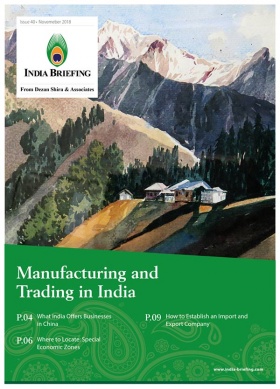Audit in India – Key Considerations for Businesses
Many investors are concerned about India’s reputation for having notoriously unclear rules and procedures and approach the audit season with no small degree of trepidation. With proper advice and some relevant knowledge of the local operating environment, however, investors will find that India’s legal and financial operational procedures are not as complex as they may have initially thought.
An audit does not need to be a costly and disruptive exercise for businesses, and an audit report can be invaluable in helping companies manage their business better and address problems or loopholes going forward by identifying irregularities and errors.
This article explains the processes a foreign-invested enterprise in India can expect to undergo during a statutory audit, and what companies need to know and prepare to make the audit process go smoothly.
Initial brief
Auditors should be provided with an overview of a company’s business activities and structure so as to enable them to provide the most thorough and accurate feedback possible. While most auditors have some general industry knowledge, briefing auditors on the specific activities a business conducts, its supply chain and procurement procedures, and existing internal controls can allow the audit process to proceed smoothly.
While auditors are expected to perform checks on internal controls independently, it can be beneficial to first explain how these internal controls function.
Purchasing and procurement procedures
Auditors will closely examine purchasing and procurement procedures, and will likely request a flow chart during audit proceedings that outlines the specifics of this process.
Preparing this flow chart beforehand can save valuable time during the audit process, and providing this to auditors even if they do not request it can enable the provision of thorough feedback that will allow businesses to better understand the efficiencies and deficiencies of their operations.
Businesses can also expect auditors to examine major purchases to ensure the company is not being overcharged for the purchase of raw materials and other supplies. It is not atypical for dishonest employees to elect to purchase from more expensive, lower quality suppliers with whom they may have some personal connection or relationship (that is, family connections or businesses and suppliers paying them a commission on purchases). By closely surveying purchasing and procurement procedures, these deficiencies can be identified and halted in the aftermath of an audit.
Auditors will additionally compare purchase vouchers with the relevant tax invoices received from the sellers of goods received notes (GRNs) to confirm whether or not the quantities and amounts match. This will allow auditors to check whether the rates of materials on invoices correspond to purchase orders raised by the company and whether the dates on GRNs relate to the current accounting period. These checks can be time consuming, and it is recommended to have a properly trained accounting team in place to assist with these checks and make it easier for auditors to evaluate a complete paper trail.
The production process
An effective auditor will additionally make note of an enterprise’s production and manufacturing process, and the various steps a company follows to convert raw materials into marketable goods. It is helpful to prepare a list of the main raw material inputs a business is using in production to facilitate this process. Companies can also expect auditors to check internal controls at this stage, especially those relating to the input of raw materials. In some respects, this aspect of the audit process relates back to the examination of purchasing and procurement procedures.
Journal vouchers, tax expense, and cash
A company’s auditor will also seek to verify whether the bills supporting journal vouchers and expenditures relate to the current period. While examining journal vouchers, an auditor will ensure that the tax deduction at source (TDS) was in fact deducted, wherever applicable. It is relatively common for companies to neglect to deduct TDS by mistake, and it is essential to ensure internal processes have not made such an oversight.
When claiming travel and other related expenses for tax deductions, companies should always ensure that supporting documentation is retained and provided to an auditor when necessary. It would be prudent to include in executives’ job descriptions and employment contracts that they must provide evidence of expenditure on business trips and other related expenses to avoid any doubt or oversight in this respect. Auditors will often seek to confirm that these expenses are within the prescribed limits outlined in the relevant job description.
Auditors are also required to check that any payment in cash or aggregate payments in cash totaling over Rs 20,000 (US$285) in one day are not claimed as a deduction (in accordance with Section 40A(3) of the Income Tax Act 1961), and also check other credit balances in cash. A company’s bank reconciliation statement should also be spot-checked by an auditor to verify expenditures.
Inventory
Manufacturing businesses need to demonstrate that they have maintained their RG 23 books and stock registers for manufacturing or processing materials. An auditor will verify that this has been done correctly, and will need to ascertain whether the RG 23A Part II / RG 23C Part II are aligned with purchase registers and whether input credits have been recorded correctly. Auditors will also check acompany’s Personal Ledger Account (PLA) register to ensure that payments were accurately made through their PLA after considering input credit. Auditors are also expected to perform a physical inspection of stock to confirm that inventory counts match the company’s inventory register.
Other reconciliations
A company’s auditor will also need to reconcile the following items:
- Excise/GST returns with purchases and sales;
- Provident fund contributions;
- Professional tax contributions; and
- Employee state insurance contributions.
These contributions are mandatory under the statute and apply to all companies in India.
Miscellaneous
- Management accounts opening balances
Businesses should also have management accounts ready in the event that an auditor wants to check that the opening balances in those accounts have been carried forward correctly from the previous year’s audited financial statements. It is not uncommon for some minor adjustments to be necessary.
- Rental agreements
It is a good idea to ensure that the rent for a factory or office has been paid on time in accordance with the rental agreement and that the rental agreements are up-to-date in advance of an audit.
- PANs for contractors
Companies must also ensure that they are properly maintaining photocopies of Permanent Account Number (PAN) cards for any contractors that come under TDS applicability. If a company has not been provided with a contractor’s PAN but is required to deduct TDS, it is necessary to deduct TDS at the default rate of 20 percent.
About Us
India Briefing is produced by Dezan Shira & Associates. The firm assists foreign investors throughout Asia from offices across the world, including in Delhi and Mumbai. Readers may write india@dezshira.com for more support on doing business in India
- Previous Article 印度最新GST将如何实施?印度GST税率、税则详解
- Next Article A Breather for Startups in India – Making the Angel Tax Exemption Work










